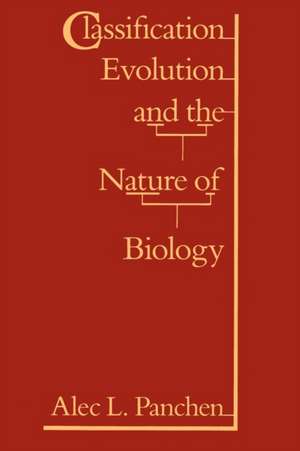Classification, Evolution, and the Nature of Biology
Autor Alec L. Panchenen Limba Engleză Paperback – 25 iun 1992
Preț: 355.17 lei
Nou
Puncte Express: 533
Preț estimativ în valută:
67.97€ • 70.70$ • 56.11£
67.97€ • 70.70$ • 56.11£
Carte tipărită la comandă
Livrare economică 15-29 aprilie
Preluare comenzi: 021 569.72.76
Specificații
ISBN-13: 9780521315784
ISBN-10: 0521315786
Pagini: 416
Ilustrații: 1
Dimensiuni: 152 x 229 x 24 mm
Greutate: 0.56 kg
Ediția:00003
Editura: Cambridge University Press
Colecția Cambridge University Press
Locul publicării:Cambridge, United Kingdom
ISBN-10: 0521315786
Pagini: 416
Ilustrații: 1
Dimensiuni: 152 x 229 x 24 mm
Greutate: 0.56 kg
Ediția:00003
Editura: Cambridge University Press
Colecția Cambridge University Press
Locul publicării:Cambridge, United Kingdom
Cuprins
Acknowledgements; 1. Introduction; 2. Patterns of classification; 3. Patterns of phylogeny; 4. Homology and the evidence for evolution; 5. Geological and geographical evidence; 6. Methods of classification: the development of taxonomy; 7. Methods of classification: phenetics and cladistics; 8. Methods of classification: the current debate; 9. Classification and the reconstruction of phylogeny; 10. Is systematics independent?; 11. Mechanisms of evolution: Darwinism and its rivals; 12. Mechanisms of evolution: the synthetic theory; 13. Scientific knowledge; 14. Philosophy and biology; References; Author index; Subject index.
Recenzii
"...should be read by everybody who seeks an up-to-date introduction to the theory and practice of comparative biology and its significance for evolutionary theory. It shows that the science of comparative biology is alive and well." Olivier Rieppel, Nature
"Panchen's argument, that a hierarchical structure resulting from evolutionary history is the basis of the special features that make up the science of biology, is not new, but it is necessary. Panchen presents the argument and related philosophical questions clearly." Samuel B. McDowell, BioScience
"Finally, for those who are acutely interested in the history and philosophy of taxonomy, this book is probably one of the more current and comprehensive treatments of this subject." Anne D. Yoder
"The book's greatest strength lies in its telling of the tale--the history and diversity of thought that underlies modern taxonomic, systematic and evolutionary theory. The breadth of material upon which Panchen draws is remarkable (his reference section totals 37 pages). If nothing else, this book will provide ready access to commentary and citations for many of the most influential works in the history of evolutionary systematics." Thomas J. Rossbach, American Scientist
"Panchen's synthesis of the historical development of classification and evolution, richly interwoven with his own critical comments and personal reflections as a vertebrate paleontologist and systematist, is provocative and stimulating...Panchen's book succeeds where other of its kind fail because he is refreshingly honest, because he maintains a healthy respect for skepticism without lapsing into the usual condescending rhetoric..." Terry Harrison, International Journal of Primatology
"Panchen's argument, that a hierarchical structure resulting from evolutionary history is the basis of the special features that make up the science of biology, is not new, but it is necessary. Panchen presents the argument and related philosophical questions clearly." Samuel B. McDowell, BioScience
"Finally, for those who are acutely interested in the history and philosophy of taxonomy, this book is probably one of the more current and comprehensive treatments of this subject." Anne D. Yoder
"The book's greatest strength lies in its telling of the tale--the history and diversity of thought that underlies modern taxonomic, systematic and evolutionary theory. The breadth of material upon which Panchen draws is remarkable (his reference section totals 37 pages). If nothing else, this book will provide ready access to commentary and citations for many of the most influential works in the history of evolutionary systematics." Thomas J. Rossbach, American Scientist
"Panchen's synthesis of the historical development of classification and evolution, richly interwoven with his own critical comments and personal reflections as a vertebrate paleontologist and systematist, is provocative and stimulating...Panchen's book succeeds where other of its kind fail because he is refreshingly honest, because he maintains a healthy respect for skepticism without lapsing into the usual condescending rhetoric..." Terry Harrison, International Journal of Primatology









